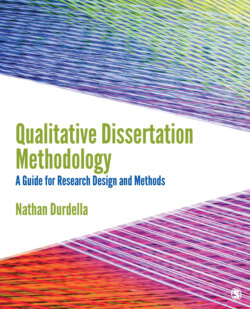Читать книгу Qualitative Dissertation Methodology - Nathan Durdella - Страница 70
На сайте Литреса книга снята с продажи.
Qualitative Dissertation Methodology in Doctoral Program Contexts
ОглавлениеCan I do a survey and interview? Can I use mixed methods? Can I just use interviews? How many participants do I need? Where do I find them? How do I recruit them? Can I do the study at my school? Should I do an ethnography, or can I just use a case study? Or how about an ethnographic case study or a case study that borrow principles from ethnography? An educational ethnography appeals to me—what about that one for my study? I’ve read a bit about phenomenology—what would that look like with my topic? Some of the very first questions from prospective and assigned dissertation advisees that I hear relate to research methodology. These questions generally focus on overall approaches to gather information in studies—through research traditions—to the nuts and bolts of fieldwork—sampling and recruitment procedures and data collection and analysis procedures.
While we tend to situate systematic and rigorous investigations in an evaluation and synthesis of empirical and conceptual literature, a natural place to start—even before or as you articulate a research problem, develop a research purpose, or formulate research questions—relates to what you will do in your study. Asking and seeking answers to questions about what will happen—how you will get from research topic and questions to results, findings, and recommendations—mitigate concerns about logistical details in executing a study and reduce anxiety related to unknown, uncontrollable elements in social science research generally and qualitative research in particular. And these questions are well suited to discussions with faculty advisors, who ultimately—later with dissertation committee member support—approve of the methodological framework that you will use in your study.
Conventionally, the methodological framework of a study emerges from the broader research framework—the research problem associated with a review of the empirical literature that informs the research purpose and questions. While this approach has been tested and used historically, early-stage doctoral students may be intimidated by more advanced steps in the research process—and a clear, articulate, well-conceptualized methodological framework is one giant step. What is more, the early use of research conventions in the initial phase of a study can sometimes feel rigid and overly structured, stymieing initial progress to make sense of a topic and test evolving ideas.
In many advising contexts, sometimes it is more of a chicken-egg scenario in the early research process where you are not quite sure what the formulaic components of the study will be: phenomena, population (group), and site (context). For example, one of my former students had an interest in examining the experiences of African American collegiate swim coaches who competed as collegiate swimmers. With an interest in exploring the experiences of African American collegiate swim coaches, some of the initial questions that this student asked were: Should I use ethnography or phenomenology? If I use ethnography, is a holistic or contextualized approach better? Can I approach a few folks I know from my collegiate swim career and current USA Swim coaching roles? The first two times that she and I met to discuss dissertation research, considerations related to the literature review arose only near the end of the second meeting. Instead, we talked about what interested her, what she would like to explore in her study, what the goals for her study were, and how she would achieve them. These discussions naturally led to the how of her research work in which she strategized about the procedural details of fieldwork, including when, where, and with whom she would collect data. This focus seemed liked a more organic process for her—as her initial questions drove the direction of the conversation.
Source: © iStockphoto.com/avierarnau
